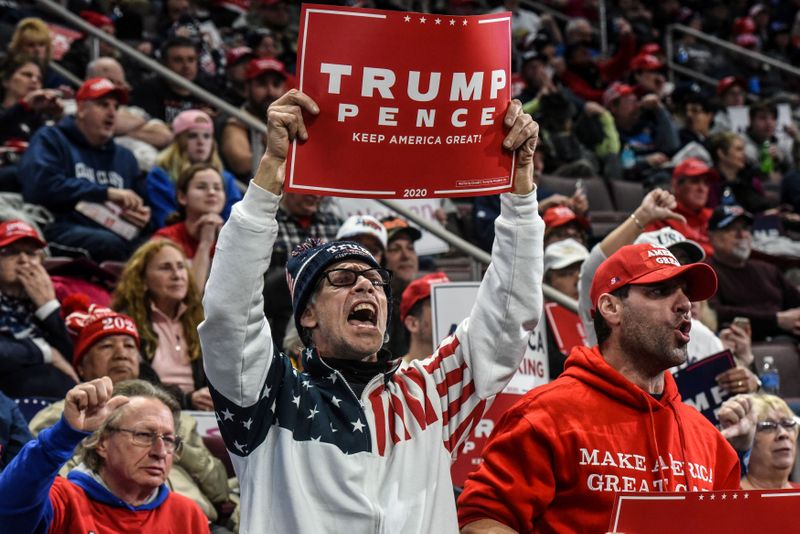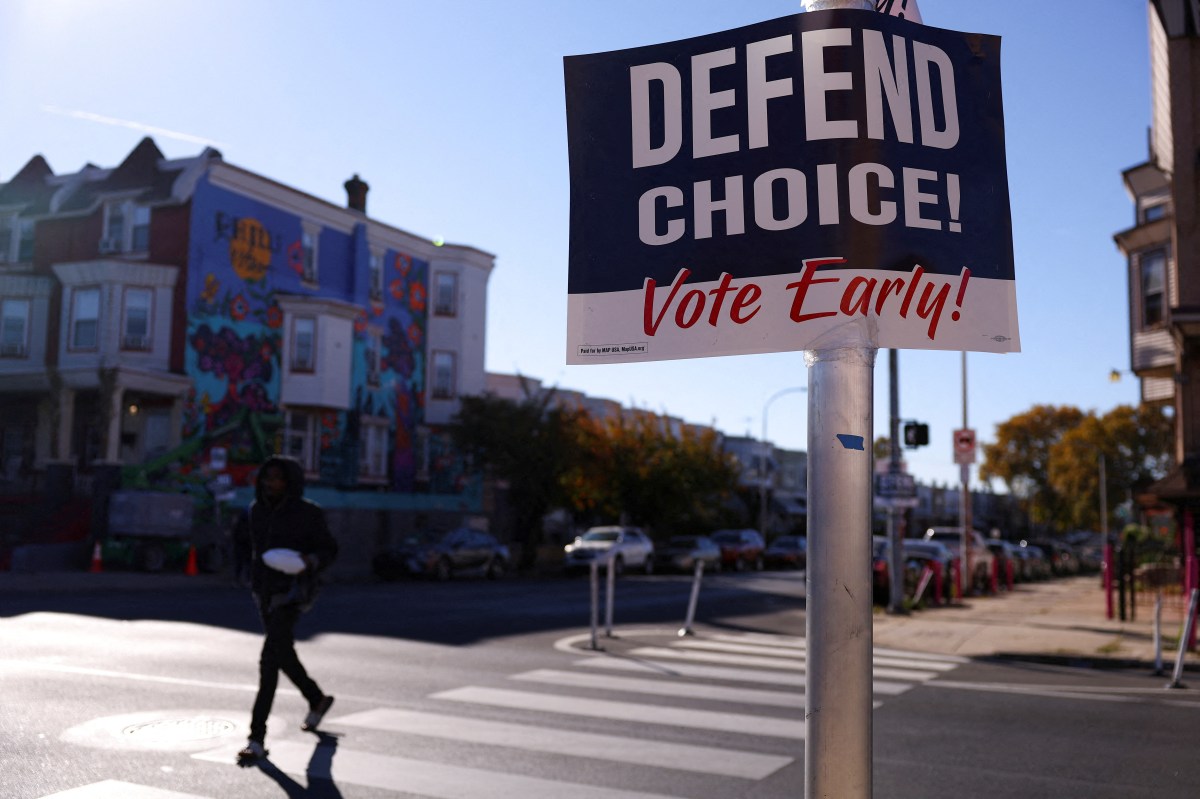LOWER MAKEFIELD, Penn. (Reuters) – With Pennsylvania’s June 2 presidential primary fast approaching, local Republican leader Mark Hrutkay took to Facebook to remind supporters they have the option to vote by mail as coronavirus sweeps the state.
Instead of thanks, Hrutkay said he got an earful from angry devotees of Republican President Donald Trump.
“I had one woman, using a lot of four-letter words, tell me ‘didn’t you know Trump hates mail-in balloting,’” said Hrutkay, the Republican chairman of Washington County, a Trump-friendly region just outside Pittsburgh.
Trump has made no secret of his disdain for mail-in voting, proclaiming frequently – without evidence – that such balloting is riddled with fraud. Hrutkay and other Republican leaders say they don’t like it either and share Trump’s skepticism about the integrity of the process.
But they said the president’s messaging may be hurting the party’s chances to win in Pennsylvania, a critical battleground state, where Democrats are dominating a surge in requests to vote by mail in the midst of the pandemic.
With less than three weeks to go before the primary, 1,178,475 Pennsylvania voters have applied for absentee ballots, a 14-fold increase from 2016. Nearly 70% of those requests have come from registered Democrats, state data as of May 13 show. That margin is far wider than the 55% to 45% registration advantage held by Democrats in the state.
Pennsylvania’s June election includes the presidential nominating contest for the major political parties. That decision has effectively been made already because Trump and his Democratic rival Joe Biden are running unopposed for their respective nominations. But the balloting also features competitive statewide and local races whose outcomes could be determined by the large contingent of absentee voters.
That’s a worrisome harbinger for Republicans looking ahead to the general election, if coronavirus remains a health threat and Democrats continue their mail-in advantage, according to Lee Snover, head of the Republican Party in Northampton County, about 70 miles northeast Philadelphia. Northampton is one of three Pennsylvania counties whose voters flipped to Trump after supporting Democrat Barack Obama in 2008 and 2012.
Trump won Pennsylvania in 2016 by the slimmest of margins – just 45,000 votes, or less than a percentage point. At stake are 20 Electoral College votes, out of 270 a candidate needs to win the presidency. Pennsylvania is one of a handful of former industrial “Rust Belt” states that could decide this year’s election.
“It’s a real problem and could be really troubling come November,” Snover said. Trump supporters “simply don’t trust the process, and the president’s comments have not helped things, for sure.”
It’s not just Pennsylvania. Republicans nationwide appear less eager to embrace voting by mail. Just one-third of Republicans said they are at least somewhat likely to vote by mail in November, compared to two-thirds of Democrats and half of independents who said so, according to an April 30-May 4 Monmouth University poll.
The Republican National Committee said it has had a team on the ground in Pennsylvania since 2016 and is aggressively educating volunteers and supporters about the process to vote by mail.
“Republican voters are much more traditional, they generally like to vote in person,” said Rick Gorka, a senior member of the Republican National Committee and part of the Trump Victory re-election campaign. “Some level of discomfort is expected, but that’s why we are diligently working to retrain voters.”
IN TRUMP THEY TRUST
But Pennsylvania Republicans such as Frank Miller, a 51-year old business owner, could prove tough to persuade. He lives in Luzerne County, a politically divided region in the northeastern part of the state. Miller says there is no way he would vote by mail in November, pandemic or no pandemic.
“Most Trump supporters are like me – we trust Trump but no one else,” Miller said. “When I see Democrats pushing it, I know there must be a sinister reason for it.”
Mail-in balloting has emerged as another highly charged issue in America’s polarized politics. Republicans in states across the country are engaged in legal battles to stop Democratic attempts to expand mail-in voting in response to the biggest U.S. health crisis in a century.
In Texas, the Democratic Party and a coalition of voters and civil rights groups have filed several lawsuits to expand mail balloting in light of the coronavirus. The Republican-led state government opposes those efforts, arguing mail ballots are prone to fraud and there’s not enough time or money to implement such a sweeping change.
In Nevada, several conservative groups have sued to block Democratic Governor Steve Sisolak’s plan to hold congressional and local primaries in June entirely by mail, arguing that, among other things, it violates the U.S. Constitution.
Lawmakers in Pennsylvania, which has a Democratic governor and a divided legislature, have gone the other way. Last year the state passed legislation making it easier for citizens to vote by mail.
November will mark the first general election in which any registered voter in Pennsylvania can request an absentee ballot without having to provide an excuse such as illness or travel, and evidence to back it up. Those restrictions severely limited the number of people who could vote absentee in the past; mail ballots accounted for just 4.6% of all ballots cast there in the 2016 general election.
Both parties recognize the need for a massive education campaign to let Pennsylvanians know about the changes.
Joe Foster, the Democratic Party head of Montgomery County, the largest suburban county in Pennsylvania, said his party’s central focus is getting voters familiarized with the new voting process in a crucial election year. Pennsylvania ranks among the states hardest-hit by coronavirus; more than 63,000 of its residents have been infected and more than 4,200 have died.
“There is not a phone call or email that I am on where the issue of signing up voters for mail-in ballots is not emphasized,” Foster said.
Those efforts are paying off. Nearly 81,000 Montgomery County voters have requested mail-in ballots for the June primary, fully 78% of them Democrats, according to local officials. Four years ago, roughly 5,670 people in the county voted by mail in the primary, divided about equally between Republicans and Democrats.
Statewide, Democrats have sent texts to at least a million supporters, logged 500,000 calls and hosted over 1,200 attendees in online training sessions, according to the state party.
Republicans, too, are gearing up. Even as Trump denounces mail balloting, his campaign has organized virtual training in Pennsylvania to teach volunteers how to get Republicans to register for absentee ballots, which can be done online or by mail.
“Republicans have always supported absentee voting with safeguards in place,” RNC spokesman Michael Joyce said. “What we oppose is a nationwide experiment that would eliminate those safeguards, invite fraud and weaken the integrity of our elections.”
In states with expansive mail balloting, Republicans have sought to purge voter registration rolls of people who have moved, died or failed to vote in several election cycles, an effort they say is needed to avoid fraud, but which Democrats say often removes eligible voters. Republicans have also sought to clamp down on so-called ballot harvesting, where volunteers collect absentee ballots from voters and submit them to be counted.
Past studies by election researchers have shown neither party has an advantage in states with a history of mail balloting and where officials automatically mail ballots to all registered voters.
In California on Tuesday, for example, Republican Mike Garcia defeated Democrat Christy Smith in a runoff for a congressional seat in the Los Angeles suburbs. That special election was conducted largely by mail in a district where Democrats hold a registration advantage.
‘WE COULD PAY A PRICE’
Voting-rights advocates have denounced Republican efforts to limit mail-in voting as particularly unfair to minorities and low-income Americans, who tend to vote Democratic and also have been hit hardest by the coronavirus outbreak.
But the Republican Party has created risks for itself by sewing doubts among its own members about casting absentee ballots in the midst of a public health emergency, said Robert Stein, a political science professor at Rice University who has studied mail balloting.
“It’s a terrible mistake for Republicans,” Stein said. “There is one party embracing innovation and there’s another fighting an obstacle, the president.”
Stein said the party that does the best job mobilizing supporters to vote by mail could gain the advantage if coronavirus is still raging in November and depresses in-person turnout.
In Pennsylvania, that prospect is worrying Sam DeMarco, head of the Republican Party in Allegheny County, which includes Pittsburgh. He said if his party continues to lag Democrats badly in mail-in voting, Republicans will be under tremendous pressure to get their supporters to the polls on Election Day to overcome the absentee-ballot deficit, a big gamble in a pandemic.
“We don’t want to start the election down 500,000 votes,” DeMarco said. “Republican leaders in the state need to embrace it or else we could pay a price.”
(Reporting By Jarrett Renshaw; Additional reporting by Tim Reid and Michael Martina; Editing by Soyoung Kim and Marla Dickerson)

























